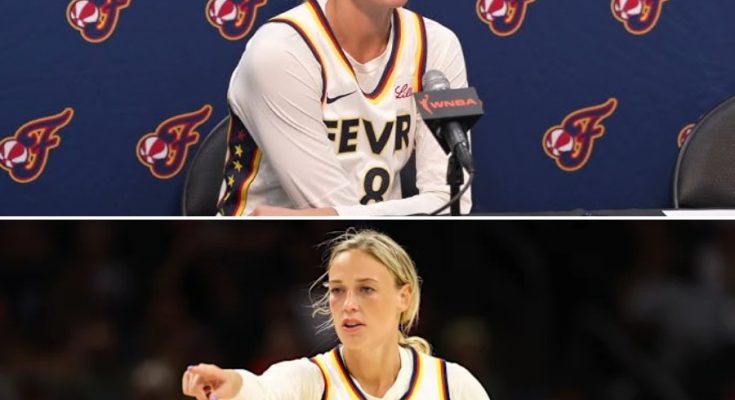
In what has become one of the most intense and talked-about moments in this WNBA season, Indiana Fever guard Sophie Cunningham has expressed her extreme frustration following yet another disappointing team performance. The Fever, who have relied heavily on their star player Caitlin Clark throughout the season, suffered a significant collapse in their latest matchup, leaving fans, analysts, and teammates stunned. The absence of Clark on the court due to an injury has exposed vulnerabilities in the team’s strategy, forcing Cunningham to confront both the team’s shortcomings and her own expectations in an emotionally charged postgame statement.
The Fever entered the game with cautious optimism. Despite Clark’s absence, the roster showed potential in preseason and early season games, demonstrating depth, resilience, and an ability to maintain competitive play even without their leading scorer. However, the reality on the court was far from hopeful. From the opening tip-off, the team struggled to find rhythm, with turnovers and defensive lapses quickly compounding the problem. Cunningham, known for her explosive energy and defensive prowess, attempted to rally her teammates, but the lack of cohesion and offensive support became increasingly apparent as the game progressed.
As the match neared halftime, Fever fans watched in disbelief as the scoreboard reflected a widening gap. Clark’s usual scoring contributions and leadership on the court were sorely missed. While Cunningham managed to contribute in multiple areas, including rebounds, assists, and timely defensive stops, the overwhelming deficit highlighted the team’s reliance on Clark’s versatile skill set. Observers noted that the team’s offensive strategies seemed disjointed without their star point guard orchestrating plays, leading to rushed shots, missed opportunities, and mounting frustration across the squad.
Following the game, Cunningham’s postgame interview captured the intensity of her emotions. She spoke candidly about the challenges the team faced in adapting to Clark’s absence and emphasized the importance of unity and mental toughness during such trying times. Cunningham’s remarks reflected both a deep commitment to her team and a sense of urgency to overcome the current obstacles. She highlighted that while individual talent is valuable, success in professional basketball requires collective effort, strategic execution, and trust in one another. Her comments resonated with fans who have followed her career, appreciating her transparency and passion for the game.
Sports analysts quickly weighed in on the significance of Cunningham’s statement. Many suggested that the Fever must rethink their approach and develop a more balanced offensive scheme to avoid over-reliance on a single player. Historical trends in professional basketball demonstrate that teams heavily dependent on one star are susceptible to collapse when injuries or absences occur. Cunningham’s candid acknowledgment of this vulnerability underscores the need for systemic adjustments in practice routines, game plans, and in-game decision-making. Additionally, her leadership qualities were praised, as she did not deflect responsibility onto others but rather called for a united effort to improve as a team.
The impact of Clark’s absence extends beyond immediate gameplay. As the Fever contend with the midseason stretch, the team faces both physical and psychological challenges. Players must step up in new roles, learn to communicate more effectively under pressure, and maintain morale despite a string of losses. Cunningham, as one of the veteran voices in the locker room, carries significant responsibility in motivating teammates, guiding younger players, and maintaining composure in high-stakes situations. Her ability to channel frustration into constructive leadership could serve as a critical factor in determining the Fever’s success during this turbulent period.
Off the court, fans and commentators have debated the team’s approach to injuries and roster depth. The Fever’s reliance on Clark has highlighted gaps in player development and the importance of cultivating a broader set of contributors capable of stepping into leadership roles when necessary. Cunningham’s outspoken response sheds light on the broader dynamics of professional basketball, where the pressures of performance, media scrutiny, and fan expectations converge. The team’s management faces decisions regarding player rotations, potential acquisitions, and adjustments to the coaching strategy to mitigate future collapses in critical moments.
Cunningham’s performance in the absence of Clark remains noteworthy. Despite the team’s struggles, she consistently demonstrated resilience and competitive spirit. Her scoring, defensive interventions, and playmaking efforts reflect a player determined to maintain a high standard of professionalism even in the most challenging circumstances. Observers have highlighted that Cunningham’s ability to remain focused and vocal amidst adversity serves as a model for young athletes and reinforces her reputation as a cornerstone of the Fever’s current roster.
The conversation surrounding the Fever’s current predicament also touches on broader themes within women’s professional sports. Issues of team dependency on star players, the mental and emotional pressures faced by athletes, and the expectations of fans and media all converge in this scenario. Cunningham’s fiery postgame comments illustrate the intensity with which athletes approach their craft and the emotional investment required to navigate setbacks. The transparency and authenticity of her expression offer a rare glimpse into the human side of professional sports, where passion and frustration coexist in a delicate balance.
Looking ahead, the Fever face a series of critical matchups that will test both their tactical adaptability and psychological resilience. Analysts predict that Cunningham’s leadership will play a pivotal role in steering the team through these challenging games. Success will depend on a combination of strategic planning, individual performance, and team cohesion. The organization’s ability to foster a culture of accountability and mutual support will also be essential in determining whether the Fever can rebound from this difficult stretch and reestablish themselves as serious contenders.
Fans have expressed mixed reactions to the ongoing situation. While some lament the team’s dependence on Clark, others celebrate Cunningham’s forthright expression of frustration, interpreting it as a sign of accountability and leadership. Social media platforms have become a hub for debates regarding the Fever’s future, player responsibilities, and the broader implications for the WNBA. Cunningham’s visibility as a vocal leader has heightened public awareness of the challenges faced by professional athletes in managing both performance and public scrutiny.
In conclusion, Sophie Cunningham’s explosive postgame reaction following the Fever’s collapse without Caitlin Clark serves as a stark reminder of the complexities inherent in professional sports. The incident underscores the importance of leadership, team cohesion, and strategic adaptability when faced with unforeseen challenges. Cunningham’s ability to channel frustration into constructive reflection and call for collective accountability highlights her maturity, professionalism, and commitment to the sport. As the Fever continue to navigate this challenging period, the lessons learned from this episode may serve as a catalyst for growth, adaptation, and renewed determination. The team’s ability to respond to adversity, combined with Cunningham’s leadership, could ultimately redefine their trajectory in the remainder of the season, offering fans a compelling narrative of resilience, talent, and the enduring spirit of competition.


